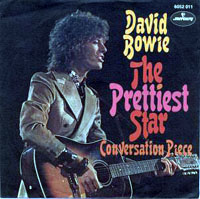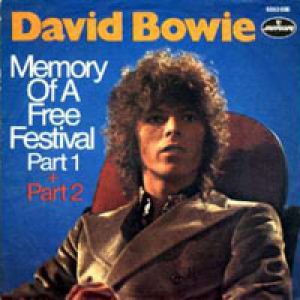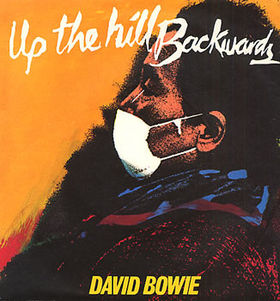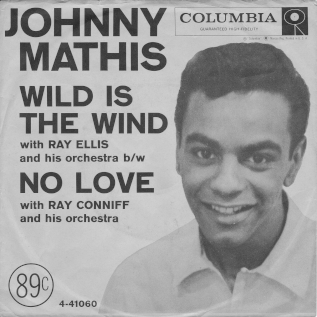Related Research Articles

David Bowie is the second studio album by the English musician David Bowie, originally released in the United Kingdom on 14 November 1969 through Mercury affiliate Philips Records. Financed by Mercury on the strength of "Space Oddity", the album was recorded from June to October 1969 at Trident Studios in London. Gus Dudgeon produced "Space Oddity", while Tony Visconti produced the rest of the album. It featured an array of collaborators, including Herbie Flowers, Rick Wakeman, Terry Cox and the band Junior's Eyes.

"The Prettiest Star" is a song by the English musician David Bowie, originally released on 6 March 1970 through Mercury Records as the follow-up single to "Space Oddity". A love song for his soon-to-be wife Angie, it was recorded in January 1970 at Trident Studios in London and featured Marc Bolan on guitar, who was brought on by producer Tony Visconti. Despite praise from music journalists, the single flopped and failed to chart. Years later, Bowie rerecorded the track for his 1973 album Aladdin Sane. A more glam rock influenced take with lyrics matching themes on the album, Mick Ronson recreated Bolan's guitar part almost note-for-note. The remake was more well-received.

"Memory of a Free Festival" is a song by the English singer-songwriter David Bowie. Originally recorded in September 1969 as a seven-minute opus for Bowie's second self-titled album, it was reworked in March–April 1970 at the behest of Mercury Records, the label believing that the track had a better chance of success as a single than "The Prettiest Star", released earlier in the year. Bowie and Tony Visconti roughly split the track in half, re-recording it so both halves could function as individual songs. A more rock-oriented version than the earlier album cut, this rendition featured guitarist Mick Ronson.

"John, I'm Only Dancing" is a song by the English musician David Bowie, originally released as a non-album single on 1 September 1972. A glam rock and R&B number, the lyrics describe a situation in which the narrator informs his lover not to worry about the girl he is with because he is "only dancing" with her. Although ambiguous, many interpreted it as concerning a gay relationship. Recorded in London in June 1972, it was boosted by a low-budget promotional video directed by Mick Rock. It reached number 12 in the UK; RCA refused to release it in America due to its suggestive lyrical content.

"Sorrow" is a song first recorded by the McCoys in 1965 and released as the B-side to their cover of "Fever". It became a big hit in the United Kingdom in a version by the Merseys, reaching number 4 on the UK chart on 28 April 1966. A version by David Bowie charted worldwide in 1973.

"Up the Hill Backwards" is a song by the English musician David Bowie, released on his 1980 album Scary Monsters . It was later issued by RCA Records as the fourth and final single from the album in March 1981. Originally written under the title "Cameras in Brooklyn", the song was recorded between February and April 1980 at the Power Station in New York City and Good Earth Studios in London. The recording features backing vocalists, guitar contributions from Robert Fripp and acoustic guitar played by co-producer Tony Visconti. Lyrically, the song concerns the struggles of facing a crisis, partially influenced by Bowie's divorce from his wife Angie. Musically, the song contains numerous time signature changes and a Bo Diddley-inspired beat.

"Wild Is the Wind" is a song written by Dimitri Tiomkin and Ned Washington for the 1957 film Wild Is the Wind. Johnny Mathis recorded the song for the film and released it as a single in November 1957. Mathis' version reached No. 22 on the Billboard chart. It was nominated for an Academy Award for Best Song in 1958, but lost to "All the Way" by Jimmy Van Heusen and Sammy Cahn from The Joker is Wild.
"Cygnet Committee" is a song written by the English singer-songwriter David Bowie and recorded in 1969 for his second eponymous album. At over 9 minutes this ambitious progressive folk rock song was Bowie's longest studio recording until the opening/title track of 1976's Station to Station.
"The Width of a Circle" is a song written by the English musician David Bowie in 1969 for his 1970 album, The Man Who Sold the World. Recorded during the spring of 1970, it was released later that year in the United States and in April 1971 in the UK. The opening track on the album, it features hard rock and heavy metal overtones. Bowie had performed a shorter version of the song in concerts for several months before recording it.
"All the Madmen" is a song written by the English singer-songwriter David Bowie in 1970 for his album The Man Who Sold the World, released later that year in the US and in April 1971 in the UK. One of several tracks on the album about insanity, it has been described as depicting "a world so bereft of reason that the last sane men are the ones in the asylums".
"Black Country Rock" is a song by the English musician David Bowie, released on his 1970 album The Man Who Sold the World. The song was recorded in May 1970, with sessions taking place at Trident and Advision Studios in London. The lineup featured Bowie on lead vocals, guitarist Mick Ronson, bassist/producer Tony Visconti, drummer Mick Woodmansey and Ralph Mace on Moog synthesiser. The track was mostly composed by Ronson and Visconti, who developed it using a basic song sketch from Bowie. Labelled under the working title "Black Country Rock", Bowie used the title to write the lyrics towards the end of the sessions, resulting in a repeated two-line verse and chorus. A blues rock and hard rock number, Bowie imitates T. Rex's Marc Bolan in his vocal performance.
"After All" is a song written by the English singer-songwriter David Bowie in 1970 for the album The Man Who Sold the World, released later that year in the United States and in April 1971 in the UK. One of a number of Bowie songs from the early 1970s reflecting the influence of Friedrich Nietzsche and Aleister Crowley, it has been described by biographer David Buckley as "the album's hidden gem", and by Nicholas Pegg as "one of Bowie's most underrated recordings".
"She Shook Me Cold" is a song written by the English singer-songwriter David Bowie in 1970 for the album The Man Who Sold the World. Mick Ronson's solo guitar is influenced by hard rock as played by Cream, Led Zeppelin and Jeff Beck. Although solely credited to Bowie, this and other songs from the album were constructed around jams by all of the musicians. Tony Visconti, who played bass on the track in addition to producing the entire album, was quoted as saying, "The songs were written by all four of us. We'd jam in a basement, and Bowie would just say whether he liked them or not."

"Rock 'n' Roll with Me" is a power ballad written by David Bowie and Geoff MacCormack and recorded in January 1974 that first appeared on Bowie's Diamond Dogs album, supposedly to address the artist's complex relation with his fans. A version recorded during the Diamond Dogs tour in July 1974 was released on the album David Live.
"Big Brother" is a song written by David Bowie in 1973 and intended for his never-produced musical based on George Orwell's Nineteen Eighty-Four. In 1974 it was released on the album Diamond Dogs. It segued into the final track on the record, "Chant of the Ever Circling Skeletal Family".

"Can You Hear Me?" is a ballad by the English musician David Bowie from his 1975 album Young Americans. Bowie called it a "real love song", written with someone in mind, but he did not identify them. The song was released as a single in November 1975 on the B side of "Golden Years".
"It's No Game" is a song written by English musician David Bowie for his 1980 album Scary Monsters , featuring lead guitar played by Robert Fripp. The song is split into two parts, opening and closing the album. "(No. 1)" is musically sinister, featuring Bowie screaming lyrics and Japanese narration provided by actress Michi Hirota. "(No. 2)", a stark contrast to "(No. 1)", is much calmer, which Bowie's biographers symbolise as Bowie facing the same situation in "(No. 1)", but after the album's duration.
"Shadow Man" is a song written by the English singer-songwriter David Bowie. It was first recorded on 15 November 1971 at Trident Studios in London during the sessions for The Rise and Fall of Ziggy Stardust and the Spiders from Mars (1972) and left unreleased. A folk ballad, the lyrics discuss topics of self-identity and doubling, and the impact one's present self has on their future lives, themes some linked to the Shadow concepts of Carl Jung.
Hype was a band formed by David Bowie in 1970. The band were originally titled 'The David Bowie Band' for their first gig on 22 February 1970 at the Roundhouse, London. The second Hype gig on 23 February at the Streatham Arms, London was performed under the name 'Harry the Butcher', for their third gig they were billed as 'David Bowie's New Electric Band' with the subtitle 'So New They Haven't Got A Name Yet'. They were billed to appear at the Fickle Pickle Club in Westcliff-on-Sea on Friday July 17 1970 as "Debut of David Bowie with Harry The Butcher".
"Let Me Sleep Beside You" is a song written and recorded by the English singer-songwriter David Bowie. It was recorded on 1 September 1967 at Advision Studios in London and marked the beginning of Bowie's working relationship with producer Tony Visconti, which would last for the rest of Bowie's career. A departure from the pop and music hall-influenced material of Bowie's 1967 self-titled debut album and other singles for Deram Records, the song displays a more rock-oriented sound with a cello arrangement from Visconti. The impressionist lyrics also depart from Bowie's prior works, describing love using the act of sleeping together rather than through emotional attachment. The song was rejected by Deram for release as a single, purportedly due to the risqué title. It remained unreleased until 1970's The World of David Bowie compilation.
References
- 1 2 O'Leary 2015, chap. 3.
- ↑ "10 David Bowie Songs That Paved the Way for 'Blackstar'". Rolling Stone. 6 January 2016. Retrieved 2016-12-10.
- ↑ Crawford, Hillary E. "12 Stunning David Bowie Songs That, Like The Man Himself, Will Never Be Forgotten" . Retrieved 2016-12-10.
- 1 2 3 4 "Unwashed and Somewhat Slightly Dazed". Pushing Ahead of the Dame. 2009-12-09. Retrieved 2016-12-10.
- ↑ "Unwashed And Somewhat Slightly Dazed" . Retrieved 2016-12-10.
Sources
- O'Leary, Chris (2015). Rebel Rebel: All the Songs of David Bowie from '64 to '76. Winchester: Zero Books. ISBN 978-1-78099-244-0.